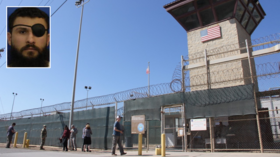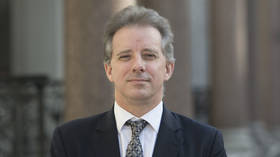Colin Powell could have been US President, but his loyalty to the Bush family overcame his sense of duty to the nation
Colin Powell could have been the President of the United States. Instead, history will remember him as the man who sold a false case for war to the UN Security Council, in violation of every principle he claimed to stand for.
Colin Powell, 84, passed away on Monday from complications brought on by Covid-19. Much will be written about the life and times of this American icon.
My appreciation of the man comes from a lifetime of parallel experiences; from 1987 through 2002, Colin Powell and I shared a common journey through American history, one which shaped my life and my opinion of a man I came to admire as someone worthy of my vote for President of the United States, and revile as a man who, when push came to shove, failed to live up to the standards he had held up for others to emulate.
I first learned about Colin Powell in 1988, when I was the slide carrier for Major Paul Trahan, an action officer with the newly formed On Site Inspection Agency (OSIA). OSIA was founded in February 1988 to implement the provisions of the Intermediate Nuclear Forces (INF) Treaty, which called upon the US and Soviet Union to eliminate two complete classes of nuclear-armed ballistic missiles deemed threatening to European peace and security. The treaty was signed in December 1987. Powell had been appointed as President Ronald Reagan’s National Security Advisor in November 1987, which meant he was not in the driver’s seat during the critical period of negotiations leading up to the treaty being signed. He had, however, served as the Deputy National Security Advisor from December 1986 through November 1987, meaning he was familiar with the issues involved.
While Powell did not play a critical role in the writing of the INF Treaty, he was a key player in getting the treaty ratified by a skeptical Senate. Major Trahan’s job, in March and April 1988, was to keep the Senators and their respective staffs fully briefed on the organization and mission of OSIA with an eye on engendering confidence that the new organization would be up to the task of effectively implementing the treaty mandate while verifying Soviet compliance with its disarmament obligations. Major Trahan was a carry-over from the original Joint Chiefs of Staff (JCS) Task Force that pre-dated the creation of OSIA and had an office in the Old Executive Office Building adjacent to the White House.
My job at the time was to accompany Major Trahan to various briefings held in the US Senate, at the State Department, the Pentagon, and the National Security Council, take notes, and update the briefing slides as needed. We were briefing a lot of high-profile Washington, DC personalities, and for a young impressionable First Lieutenant, it was a heady experience. On one occasion, while I waited for Major Trahan in the Old Executive Office Building, I watched as a tall black man, dressed in a suit and tie, accompanied by a bevy of assistants, some in civilian clothes, other in military uniform, walked by. “That’s Lieutenant General Colin Powell,” Trahan said to me. “The people we brief might think they are the ones calling the shots. But he’s the HMFIC,” using an acronym for a term well-known to anyone who served in the military—“Head Mother F***** In Charge.”
Powell played a critical role in navigating the difficult political waters surrounding the issue of treaty ratification, ultimately helping usher in a 93-5 vote in favor.
Powell was also the prime architect of the US posture at the June 1988 Moscow Summit between President Reagan and Soviet Premier Mikhail Gorbachev. If one were to search for a tipping point which marked the beginning of the end of the Cold War between the US and Soviet Union, the period between the signing of the INF Treaty in December 1987 and the exchange of ratification instruments in Moscow in June 1988 was it. And Colin Powell was the man who helped make it happen.
I spent the next two and a half years working in the Soviet Union at a ballistic missile factory implementing the provisions of the treaty and, in doing so, bearing witness to the policies of perestroika and glasnost which had taken root under the leadership of Mikhail Gorbachev. Nothing happens in a vacuum, however, and the role Reagan’s HMFIC played in bringing about critical changes in US-Soviet relations during this time has gone largely ignored by historians.
My next experience with Colin Powell came in the fall of 1990. Ronald Reagan was out of the White House; George Herbert Walker Bush was in. Saddam Hussein had invaded Kuwait, and the US was preparing a military response intended to evict Iraqi forces from that nation. Colin Powell had by this time been promoted to the rank of full General and was serving as the Chairman of the Joint Chiefs of Staff. A fellow General, Norman Schwarzkopf, was in the process of finalizing a campaign plan that put two Marine Divisions on the ground in a classic ground combat configuration for the purpose of launching an attack head-on into the thickest Iraqi defensive positions. The Commandant of the Marine Corps, General Al Gray, was concerned about this plan, as was Colin Powell.
Also on rt.com While Bush & Biden praise the late Colin Powell, ‘war criminal’ trends on TwitterPowell authorized a member of his staff to reach out to Major General Matt Caulfield, the Director of the Marine Corps Warfighting Center, to help Caulfield develop operational concepts for the employment of Marine forces that avoided being slaughtered in Iraqi trenches. Matt Caulfield formed what he called an “ad hoc study group” to finalize alternative plans, and I was brought on as the intelligence officer. The ad hoc study group briefed its work to General Gray, who authorized a team to travel to the Middle East to try and convince Schwarzkopf to change his plan. The mission failed, and the Gulf War unfolded as Schwarzkopf envisioned. But I was struck by the concern Powell had for the lives of Marines, and his willingness to seek unconventional solutions to difficult problems.
My next interaction with Powell came mid-way through the Gulf War. I was involved in counter-SCUD operations, trying to interdict the Iraqi missiles before they could be launched against either Israel or the Arabian Peninsula. There was great pressure to be seen as killing SCUDs to keep Israel out of the war.
On one occasion, US aircraft bombed suspected SCUD targets in western Iraq. The US Air Force claimed seven SCUDs killed and had a video to back it up. I was the primary battle damage assessment (BDA) officer for SCUDs, however, and when I examined the video, it was clear the vehicles and objects destroyed were not SCUD related. Schwarzkopf, however, went on national TV to brief this success. The next morning, when I prepared the official BDA report, I crossed out the number seven under the column listing “confirmed kills” and put down “zero.”
I was immediately confronted by a Colonel, who instructed me to change the numbers. This I could not in good faith do, and I was relieved from my BDA responsibilities, replaced by someone not so married to the facts. My initial report, however, had made it to Washington, DC, where it came across Colin Powell’s desk. He called Schwarzkopf and informed him that the missile claim was bogus. Later, a detailed intelligence assessment from the Defense Intelligence Agency confirmed my findings. I was given my job back. When you’re a junior Captain, it's nice to have the Chairman of the Joint Chiefs go to bat for you.
Powell was also the man responsible for ending the Gulf War prematurely. The original concept of operations called for the destruction of the Iraqi Republican Guard, correctly identifying it as the center of gravity for Saddam’s regime. The war plan had unfolded in a manner which had the Republican Guard caught in a cauldron by US and coalition forces. Another 24-36 hours, and these Iraqi forces would be annihilated.
Powell, however, was sensitive to the political fallout from images of the destruction of an Iraqi convoy outside Kuwait City by US aircraft. This so-called “highway of death” was causing people to begin to question what had otherwise been a flawless campaign. Powell argued that the fighting should come to an end, even if it meant the Iraqi Republican Guard survived. This decision, more than any other, enabled Saddam Hussein’s regime to survive the war, and created the conditions for a decade of instability in the Persian Gulf.
Colin Powell stayed on as the Chairman of the Joint Chiefs following the election of President Bill Clinton and was serving in that role when I joined the United Nations Special Commission (UNSCOM), charged with disarming Iraq in the aftermath of the Gulf War.
By October 1991, relations between the UN inspectors and the US government were in crisis mode. Ironically, the UNSCOM effort was being coordinated by three Americans—Doug Englund, the Chief of Staff, Tom Brock, the Director for Operations, and me, as the UNSCOM intelligence officer. Doug, Tom, and I all cut our arms-control teeth on the INF treaty and viewed the legal mandate of the inspections (in this case, Security Council resolution 687) as sacrosanct.
The CIA, however, was of the mind that inspectors should be more aggressive, to the point of operating outside its legal mandate. Doug, Tom, and I had put forward a very aggressive plan of action which the CIA opposed. The CIA approached Colin Powell, seeking the removal of all three of the troublesome Americans. After an investigation, however, Colin Powell sided with Doug, Tom, and I. Again, having the Chairman of the JCS going to bat for you is never a bad thing.
Later in the fall of 1993, I was leading a major inspection in Iraq looking for the possible remnants of an Iraqi SCUD missile force. The potential for this mission to lead to conflict was high, and Colin Powell became personally involved, receiving a weekly briefing on the inspection as it was planned, trained, and implemented.
Also on rt.com I saw up close how Rumsfeld deliberately caused the deaths of US troops for personal gain. He deserves a special place in hellPowell made sure adequate US support was provided and assigned an officer from the Special Operations Divisions of the JCS as a liaison. The inspection unfolded as planned, helping prove that Iraq had, in fact, complied with its obligation to dismantle its SCUD missile force. Powell had been supportive of this objective. However, Powell stepped aside in September 1993, before the mission had ended. Without Powell to back us up, the CIA was able to engage in a campaign of disinformation, denigrating the inspection results and nullifying the conclusion by claiming, without evidence, that Iraq retained up to 200 SCUD missiles. Powell’s absence was felt by all.
Colin Powell left the military and entered a life of retirement. I continued in UNSCOM until August 1998, when I resigned in protest over US interference in the inspections. I testified before a combined session of the Senate Foreign and Armed Services Committees about US policy shortcomings, an action which garnered me an invitation to a conference organized by Forstmann & Little, a private equity firm specializing in leveraged buyouts which, by 1998, was one of the most influential companies in the United States, a position it was able to leverage to staff the various boards of directors it controlled with some of the most influential people in America. Every September, the Forstmann brothers, Teddy and Nick, would host a conference in Aspen, Colorado, where it would put on panels on national security and domestic policy issues staffed by many of these board members, which in 1998 included Colin Powell.
As a recent “celebrity” (given my Senate testimony), I was invited to attend the 1998 conference, where among numerous luminaries, I was able to spend some time talking with Powell on a wide variety of issues, including Iraq. I was taken in by his intelligence and easy-going personality, as well as his informed takes on the many problems facing the world and the United States. This man, I thought, could easily become President if he chose to run. There had been talk of a Powell candidacy in 1996, but Powell decided against it. Based upon my previous experience with him as a leader, the Aspen encounter cemented my support for Colin Powell if he ever did decide to make a run for the White House.
Powell’s next opportunity to seek the Presidency came in 2000. However, when the son of George HW Bush, George W. Bush, decided to run himself, Powell put loyalty to the Bush family over personal ambition, and supported Bush’s successful campaign. Powell was rewarded by being appointed Secretary of State, the first black person to hold the job. I had high hopes for Powell, especially in the aftermath of the 9/11 terrorist attacks, as the US moved closer to a war with Iraq–a nation that had nothing to do with the events of 9/11.
But something had changed. In the fall of 2002, when I spoke out against the Bush administration’s case for war with Iraq, Colin Powell publicly chastised me when I challenged the Bush administration’s claims about Iraqi WMD as factually unfunded, telling reporters that “Ritter has been out of the intelligence chain for quite some time.” Powell made this statement despite knowing that the CIA had acknowledged that there was no new intelligence information about Iraqi WMD, and that their own information dated back to 1998—when I was very much in the center of the intelligence chain regarding Iraqi WMD. Powell went on to fail the ultimate test of his personal integrity, delivering a speech before the UN Security Council in February 2002 where he sold that body, and the world, a false bill of goods. His entire presentation was predicated on information he and the CIA knew was false, and yet he delivered it anyway, his loyalty to the Bush family overcoming his sense of duty to the nation.
Unfortunately, Colin Powell will be defined by his performance before the Security Council–no amount of mea culpas could ever absolve him of the role he played in legitimizing the most illegitimate of conflicts, paving the way for the invasion and occupation of Iraq by US forces which resulted in thousands of Americans, and hundreds of thousands of Iraqis, being killed.
Colin Powell was the man who could have been President, had he acted on that ambition in either 1996 or 2000. By caving in to the pressures brought to bear by personal political loyalty, however, Powell exposed the reality that he was no different than any other person who aspires to positions of national leadership, willing to sacrifice the national good in the name of personal interest.
Subscribe to RT newsletter to get stories the mainstream media won’t tell you.
The statements, views and opinions expressed in this column are solely those of the author and do not necessarily represent those of RT.
















